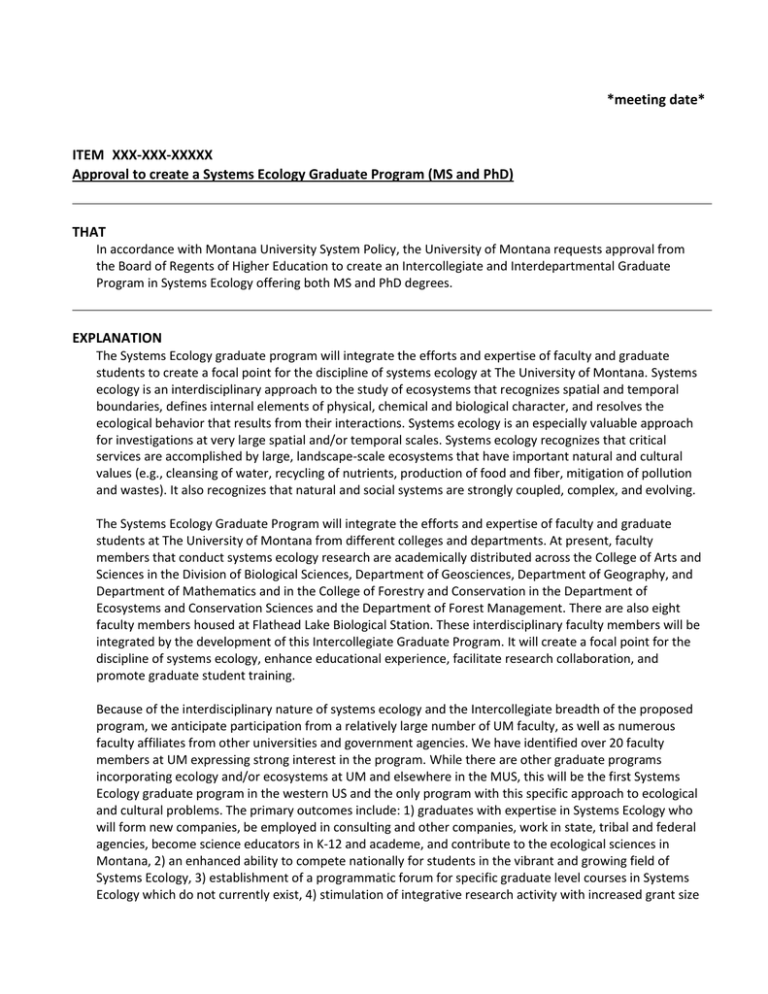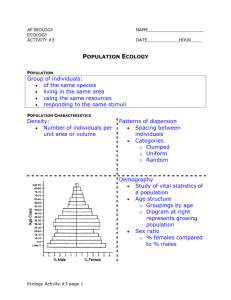*meeting date* ITEM XXX-XXX-XXXXX
advertisement

*meeting date* ITEM XXX-XXX-XXXXX Approval to create a Systems Ecology Graduate Program (MS and PhD) THAT In accordance with Montana University System Policy, the University of Montana requests approval from the Board of Regents of Higher Education to create an Intercollegiate and Interdepartmental Graduate Program in Systems Ecology offering both MS and PhD degrees. EXPLANATION The Systems Ecology graduate program will integrate the efforts and expertise of faculty and graduate students to create a focal point for the discipline of systems ecology at The University of Montana. Systems ecology is an interdisciplinary approach to the study of ecosystems that recognizes spatial and temporal boundaries, defines internal elements of physical, chemical and biological character, and resolves the ecological behavior that results from their interactions. Systems ecology is an especially valuable approach for investigations at very large spatial and/or temporal scales. Systems ecology recognizes that critical services are accomplished by large, landscape-scale ecosystems that have important natural and cultural values (e.g., cleansing of water, recycling of nutrients, production of food and fiber, mitigation of pollution and wastes). It also recognizes that natural and social systems are strongly coupled, complex, and evolving. The Systems Ecology Graduate Program will integrate the efforts and expertise of faculty and graduate students at The University of Montana from different colleges and departments. At present, faculty members that conduct systems ecology research are academically distributed across the College of Arts and Sciences in the Division of Biological Sciences, Department of Geosciences, Department of Geography, and Department of Mathematics and in the College of Forestry and Conservation in the Department of Ecosystems and Conservation Sciences and the Department of Forest Management. There are also eight faculty members housed at Flathead Lake Biological Station. These interdisciplinary faculty members will be integrated by the development of this Intercollegiate Graduate Program. It will create a focal point for the discipline of systems ecology, enhance educational experience, facilitate research collaboration, and promote graduate student training. Because of the interdisciplinary nature of systems ecology and the Intercollegiate breadth of the proposed program, we anticipate participation from a relatively large number of UM faculty, as well as numerous faculty affiliates from other universities and government agencies. We have identified over 20 faculty members at UM expressing strong interest in the program. While there are other graduate programs incorporating ecology and/or ecosystems at UM and elsewhere in the MUS, this will be the first Systems Ecology graduate program in the western US and the only program with this specific approach to ecological and cultural problems. The primary outcomes include: 1) graduates with expertise in Systems Ecology who will form new companies, be employed in consulting and other companies, work in state, tribal and federal agencies, become science educators in K-12 and academe, and contribute to the ecological sciences in Montana, 2) an enhanced ability to compete nationally for students in the vibrant and growing field of Systems Ecology, 3) establishment of a programmatic forum for specific graduate level courses in Systems Ecology which do not currently exist, 4) stimulation of integrative research activity with increased grant size Attachment #2 Page 2 and volume, 5) improvement in the ability to attract and retain top-quality faculty in this discipline, and 6) enhanced relationships and increased capacity to conduct collaborative research with colleagues having similar interests across the MUS. ATTACHMENTS Level II Request Form Proposal Narrative






